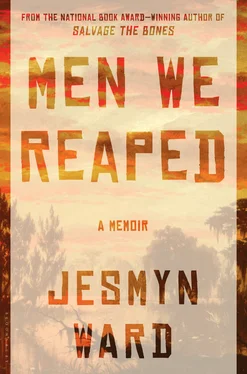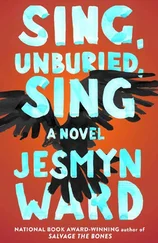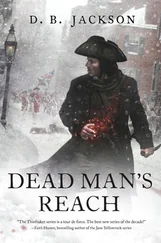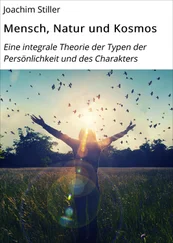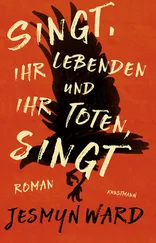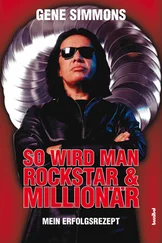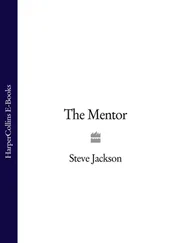“The dog. It bit Jesmyn,” my aunt said.
Her voice freed my mother from her shock. She called my father, who turned on the water in the bathtub. He picked me up, put me in the water. I hollered. The water turned red. My mother pulled off my shirt, took the cup she kept near the tub to rinse us with when she gave us a bath and poured water over my head. The cuts and gashes sizzled. I screamed.
“We have to wash you off, Mimi,” they said. “It’s okay.”
My mother bloodied her towels as they dried me off, and when she dressed me, I bled through my T-shirt. My father drove us to the hospital. Joshua sat quietly and solemnly in the passenger seat. My mother and I sat in the back of the car, and I lay my head on her lap; my mother laid her hands lightly on the cotton towel they’d wrapped around my head, the cotton staining red. At the hospital, a nurse, tall and White, said to me: “Oh, you got bit by a dog, did you?” My wounds throbbed, and I thought she was stupid. What did she think had happened? When the doctors gave me a rabies shot, they called in four men, and each held one of my five-year-old limbs. I bucked against them. Afterward, they sewed me up. I had three deep puncture wounds on my back. I had a three-inch gash running from the top of my left ear, parallel to my collarbone, back to the nape of my skull. They did not sew any of these. These they disinfected and bandaged. What they did sew was the bottom of my left ear, which had been ripped nearly off, and which hung on by a centimeter of flesh and skin.
“A pit bull did this?” the doctor asked.
“Yes,” my father said.
“She fought,” my mother said.
“These dogs go for the neck,” the doctor said. “If she hadn’t fought …”
“I know,” my father said.
My parents brought me home and I crept around the house. Cousins and neighbors visited. Marty brought my mother the small gold hoop earring I’d worn in my left ear, which he’d found in the bloody gravel. When my father stood in the middle of a gathering of boys and men in the front yard, some who leaned on the hoods of their cars, some who squatted on the ground, some who stood like my father, some of whom were young as fourteen, some of whom were old as sixty, my father said that if I had not fought, I would have died. He said the dog had been trying to rip out my throat. He said the girl dog must have been in heat, and Chief must have thought I was a threat. All of the men held rifles, some like babies in the crooks of their elbows, some thrown over their shoulders. My father dispersed the men, and they went off to hunt the dog: he’d been slinking around the neighborhood, trying to find his way back home. My father found him and shot Chief in the head and buried him in a ditch. I did not tell them that I had started the fight. That I had smacked Chief on his back. I felt guilty. Now, the long scar in my head feels like a thin plastic cocktail straw, and like all war wounds, it itches.
My dog bites had healed to pink scars when my mother and father had their last fight in that house, and it must have been spring because the windows were open. We were preparing to move again, this time to the small trailer that we would live in for a year, my parents by degrees driving each other to even more misery, my brother and sister and I the happiest we’d ever been in our young lives, ignorant of their fights because my parents became so adept at hiding their arguments from Nerissa and Joshua and me. But that night in 1984, they broke and could not contain their ire, my father because he felt shackled by the fact that he had a wife and kids who needed loyalty and fortitude, and my mother because my father had told her he could give us those things, and she was realizing he couldn’t. By that time, he’d had his first child out of wedlock. With that, my mother was realizing that soon her mother’s story would be hers.
My parents were screaming at each other, their voices loud and carrying out of the windows, but I could not understand what they were saying. I heard one word repeated over and over again: you. You and you and you and you! This was punctuated by throwing things. The sun had set, and the evening sky was fading blue to black. Above Joshua’s and my head, bats swooped, diving for insects. The windows shone yellow. Nerissa, one year old then, was in the house with our parents, and she was crying. Joshua and I sat on the dark porch, and I held him around his thin shoulders. He was shaking, and I was shaking, but we could not cry. I hugged my brother in the dark. I was his big sister. My mother and father yelled at each other in the house, and as the bats fluttered overhead, dry as paper, I heard the sound of glass shattering, of wood splintering, of things breaking.
Demond Cook. Born: May 15, 1972. Died: February 26, 2004
I never knew Demond when he was younger. I came to know him as an adult, when he was old enough to have sharp smile lines and the thin skin at his temples was threaded through with veins. The skull beneath looked hard.
I met Demond when Nerissa lived in a large two-bedroom apartment in Long Beach. Nerissa was the first of the four of us to leave home and rent her own place in Mississippi. I was the eldest and the first to move away a distance, but in some ways Nerissa had been the first to grow up, the first to cut ties with our mother and leave her house. She had little choice. My mother had kicked her out after they’d repeatedly disagreed on Nerissa’s mothering of De’Sean, who by then was three years old. De’Sean was a brown boy with a flat nose he inherited from his nineteen-year-old father and a ready smile filled with teeth like candy, small and perfect. Nerissa was the middle girl, taking on the middle child role, and once when we were all younger, Joshua had told her in an argument: “Mama and Daddy love you the least. All of us are special: Mimi’s the oldest, Charine’s the youngest, and I’m the only boy — think about it.” And even though this wasn’t true, it colored Nerissa’s sense of self and made her want to act out, to be special to someone: her parents, the boys drawn to her by her beauty and her funny, casual coolness. We have a tight bond, we three sisters, which meant that both Charine and I spent days at Nerissa’s first apartment, sleeping on old couches our cousin Rhett had given her. I was sitting at the glass table my mother’d given Nerissa as a house warming gift, after they’d reconciled, when Demond walked in the front door with Rob, Nerissa’s longtime boyfriend.
Demond was around five foot ten, and he had my brother’s coloring: tan, light brown hair, but he was shorter-limbed and more compact in the chest. He was mostly muscle, where my brother had been softer, still losing his preteen baby fat. Demond wore his hair in dreads that swung and brushed his shoulders when he spoke.
“What’s up, Pooh?” This was Rob’s nickname for Nerissa while they were dating. Demond put a cigarette in the corner of his mouth, lit it, talked around it.
“What’s up, Demond?” Nerissa said. Demond smiled at her and put his arm around her. He was yet another of Rob’s friends that she was close to: they confided in her because they liked her dimples, her smile, her warmth and openness. They told her their secrets, and she kept them. She embodied femininity in the way she sat, legs crossed, toes painted and polished, a bundle of curves, and then sullied it with the way she cussed easily and made them laugh.
I was drinking a beer. There were many beers in the apartment that year: cold bottles in tight brown sleeves on counters, on tables, leaning in loose hands on laps, on sofa arms. It was 2003. We’d gone crazy. We’d lost three friends by then, and we were so green we couldn’t reconcile our youth with the fact that we were dying, so we drank and smoked and did other things, because these things allowed us the illusion that our youth might save us, that there was someone somewhere who would have mercy on us. We drank Everclear in shots in cars loud with beat under overcast, dark-smothered skies, night after night. My cousins turned the hot tip of blunts to the insides of their mouths, exhaled, pushing smoke out into each other’s mouths. This is what it means to live , we thought.
Читать дальше
